The Impact of Artificial Intelligence on Digital Marketing
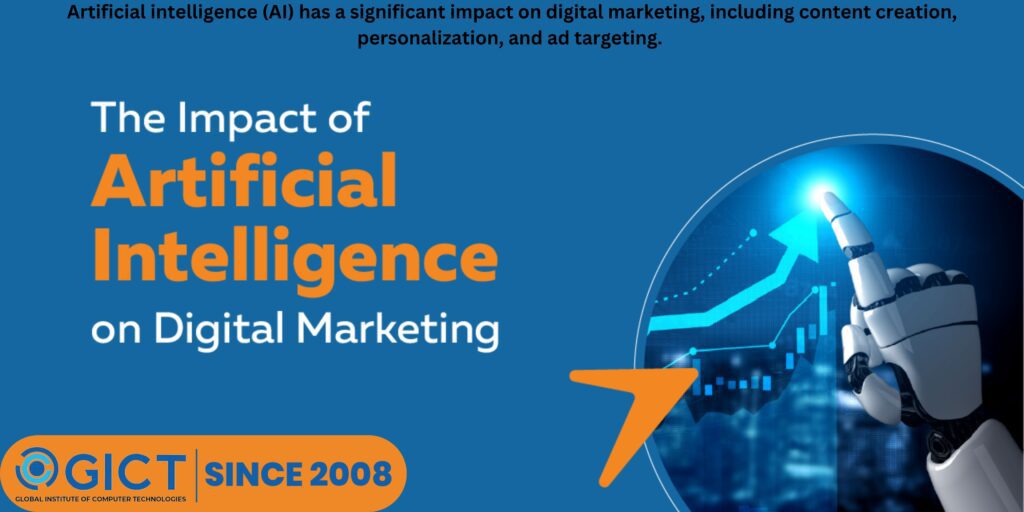
Often we hear words about the Impact of Artificial Intelligence in digital marketing too deep. Why can’t we think about it in this digital world where it has actually changed everything. Regarding how companies use marketing techniques to connect with their audiences? From predictive analytics to hyper targeted advertising AI has coined all the rules of digital marketing till date. The most data driven most efficient and customized ways. As AI moves forward however it will continue to work itself into the inner workings of digital marketing to give businesses. An upper hand in remaining competitive in this more digital environment.
Understanding AI in Digital Marketing
AI in digital marketing is a combination of sophisticated algorithms, machine learning and data analytics. Which work together in rendering marketing campaigns more efficient and effective. In essence AI enables the marketer to automate and optimize certain aspects of the strategies. Via intelligent data processing and predictive insights from content creation to customer interaction. The basic pillars of AI in the digital marketing field are these machine learning, natural language processing (NLP), and data analytics.
Machine learning is the process by which AI systems evaluate large kinds of datasets and learn about consumer behavior. So that marketers can ideally give personalized experiences. NLP is where AI understands, interprets, and works with human languages. So any task that involves communication with human beings such as chatbots, email marketing. Even content generation, utilizes natural language processing to accomplish its goal. With AI, you can do something more: it analyzes consumer interaction across different platforms, and through such analysis. Useful insights become available that enable more informed decision-making and campaign optimization.
Some key points to help further understand AI in Digital Marketing:
1. For Predictive Analysis, Machine Learning: AI uses machine learning to best analyze huge quantities of data to predict consumer behavior helping marketers foresee trends and to provide targeted content at the optimal time.
2. Personalized Customer Experience: AI is capable of customizing marketing messages, recommendations and content to individual user preferences and past behaviors taking personalization a step further in digital campaigns.
3. Natural Language Processing (NLP): Natural Language Processing is what allows AI to understand and manipulate human language, which can be applied in areas like customer support via chatbots, sentiment analysis, and automated content generation.
4. Automating Repetitive Tasks: AI can assist in automating the ongoing marketing tasks, which include managing email campaigns, social media posts, and even lead scoring. This set of automated activities will help save time and minimize manual errors.
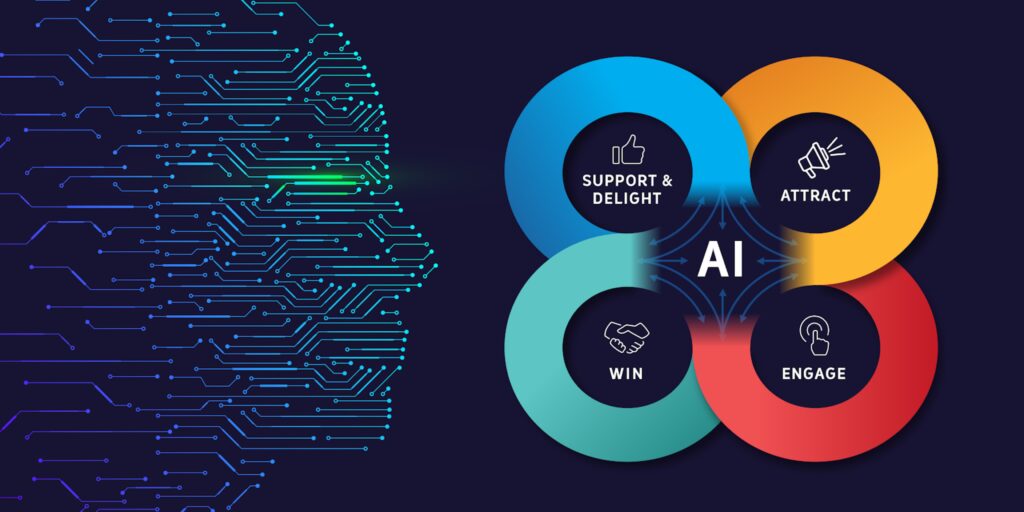
AI-Powered Personalization
The Impact of Artificial Intelligence that has occurred in the personal touch of the business with the customer. By AI-coupled technology is revolutionary: delivering greatly personalized experiences according to unique behaviors and preferences. With advanced algorithms, machine learning, and advanced data analysis, AI gathers information. Such that: content, product recommendations, and even personalized journeys are created. So that every customer feels more in touch with it. Not only does such a level of personalization increase customer satisfaction, but also conversion rates and customer loyalty.
Key aspects of AI-powered personalization in digital marketing:
Personalized Product Recommendations: AI can keep an eye on a users previous buying behaviors. Either through browsing history or preferences and suggest goods to them. This is applicable to personalization in e commerce platforms like Amazon Netflix etc. Where one is being recommended products or shows that they are most likely to buy or watch.
Dynamic Website Content: AI will allow the site to update its content according to the preferences and behavior of a visitor. For example, the e-commerce sites could show personalized banners, discounts. Or product recommendations based on surfing history or past browsing activity with the site as the criterion.
Personalized Email Campaigns: AI usually helps send personalized email marketing communications with product recommendations. Or personalized offers personally to the recipient- thus making the content most relevant to the individual subscriber. That way, the open and click rates are optimized, as are the engagement levels.
Behavioral Targeting and Retargeting: AI collects data on the user’s interaction throughout the touchpoints. And it can easily target a particular ad based on his behavior pattern from the past viewed pages as well as added product in the cart. It helps retarget customers with most relevant ads that increase the probability of conversion.
On the one hand, the fact that online brands are intensifying efforts towards building more meaningful connections. Through AI-enabled personalization translates to higher numbers when it comes to customer engagement, loyalty, and conversions. On the other, these real-time experiences, now more personalized than ever, are going to become the differentials. By which businesses will define themselves from the competition in the future, as AI evolves.
Automation in Digital Marketing
Automation in digital marketing has come to mean software or technology to automate. Organize, and optimize a marketing task and workflow in order to minimize human effort while obtaining maximum efficiency. All the massive data plus numerous demands of managing many digital channels keep the marketer fixing. His attention on strategy and creativity, leaving the more repetitive and tiring work to the intelligent machines. Time saving, thus, leaves a company open to the opportunity for scaling its marketing efforts and delivering consistent, personalized customer experiences. Learn more about the Impact of Artificial Intelligence and how it’s revolutionizing digital marketing strategies here.
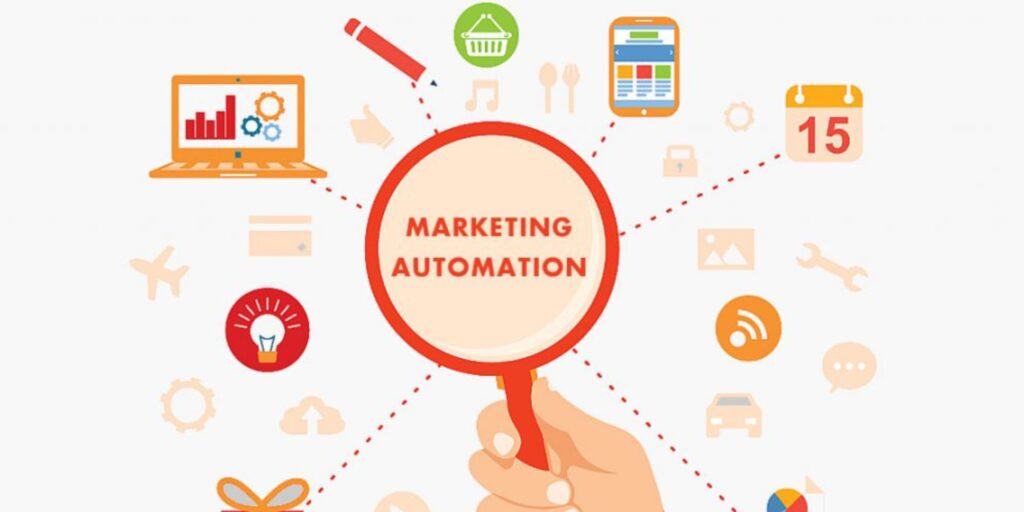
The key ways automation in digital marketing is transforming the industry:
1. Email Marketing Automation
Marketing automation for email enables businesses to send emails targeted and personalized to users’ behavior and preferences. Automated workflows such as welcome emails, abandoned cart postings. And re-engagement campaigns are put into action by the behavior of users. Automating these campaigns keeps businesses in timely and relevant communication with the customer, which helps enhance engagement and conversions.
2. Social Media Scheduling and Management
These social media automation tools like Hootsuite Buffer or. Sprout Social allow marketers to schedule and manage posts ahead of time across multiple platforms. Such tools can also analyze audiences behavioral trends optimize posting times and maintain brand presence across social media channels. With automation, businesses can remain active on social media without requiring constant tactical attention. It also facilitates the management of larger campaigns, performance tracking, and follower engagement.
3. Lead Scoring and Nurturing
Automation aids lead generation by assigning scores to leads based on their interactions with and engagement with a business’s digital content. The AI systems evaluate the probability of leads converting into customers through actions like downloading a resource, clicking on an email, or visiting a key website. After scoring, leads are nurtured through automation with email campaigns, content, and offers that may interest them. So, finally, they are led through the sales funnel.
4. Content Curation and Distribution
Content marketing can be enhanced with automation by using tools that curate and distribute relevant content to your audience. Tools like BuzzSumo, Curata, or Mailchimp’s content automation features can help marketers discover popular content in their industry and automatically share it with their audience. Additionally, AI-driven platforms can help businesses generate and publish content across various channels with minimal manual effort, ensuring a consistent flow of engaging materials.
5. Customer Relationship Management (CRM) Systems
Among various CRM systems Salesforce and HubSpot are known to automate everything under customer interaction workflows. These systems record customer data, behavior and purchase history, thus enabling the creation of automated follow-ups, reminders and communication schedules. By personalizing these far-seeing interactions through automation businesses can thereby strengthen customer relationships, enhance loyalty and sustain engagement over the long haul.
AI in Predictive Analytics
One of the powerful tools for AI, predictive analysis uses historical data, machine learning algorithms and statistical techniques to predict future outcomes, trends, and customer behaviors. In digital marketing Impact of Artificial Intelligence -powered analytical applications predict customer preferences demands business performance, trends and results by processing large amounts of collected data across multiple touchpoints such as websites, social media and email campaigns. Predictive analytics help companies to ensure that their marketing strategies are optimized and customer experiences improved by making data-based decisions.
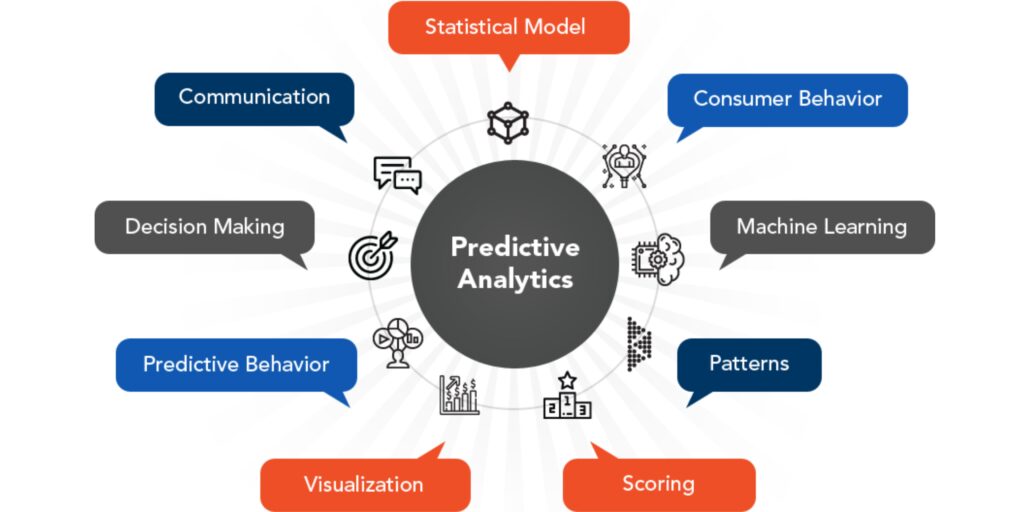
Some key ways AI in predictive analytics is reshaping digital marketing:
1. Lead Scoring and Conversion Prediction
Anyways, Predictive and prescriptive data analytics will help marketers to sort qualified leads as per the use of these models: analyzing past interactions, demographic information, engagement levels, engagement level, and so on. It will basically work in the predictive analytics by allocating lead score based on how likely it would be transformed from a lead to an actual paying customer. It allows the marketer to increase sales funnel efficiency by developing high-value prospects. The result is the improvement of conversion rate.
2. Customer Segmentation and Targeting
By predicting possible behavior, preferences, and future actions of customers, predictive analytics can essentially also segment customers into various groups. Segments identified by businesses can then be the recipients of highly targeted personalized campaigns. For example, AI can predict which customers will most likely respond to particular offers or campaigns and have that messaging customized to enhance marketing engagement.
3. Churn Prediction and Retention Strategies
Retention of customers is indeed an important facet of digital marketing, and by using predictive analytics, a company can identify customers about to leave. It provides the prediction on likely terminating customer groups by analyzing past data regarding the customer behavior. This data is what enabling marketers to come up with targeted retention strategies, for example, through personalized offers, rewards programs, or re-engagement campaigns, thus turning churn into value-added customer lifetime value.
4. Demand Forecasting
AI-driven predictive analytics affords the ability to forecast demand for products/services by investigating seasonal trends, historical sales data, and external factors (such as economic conditions or industry trends). Thus, it helps businesses optimize inventory levels, adjust marketing spend, and ensure the capability of fulfilling customer demand in a timely manner. Accurate demand forecasting also helps marketers think about campaigns in relation to peak buying seasons.
Chatbots and Customer Support
Chatbots are changing the way businesses interact with customers, especially in the area of customer support. With AI-powered chatbots aiding the marketing strategy of a company, businesses can help customers 24/7, refine the support process, and improve overall customer satisfaction. Here are ways how chatbots can benefit the customer support landscape in the digital space:
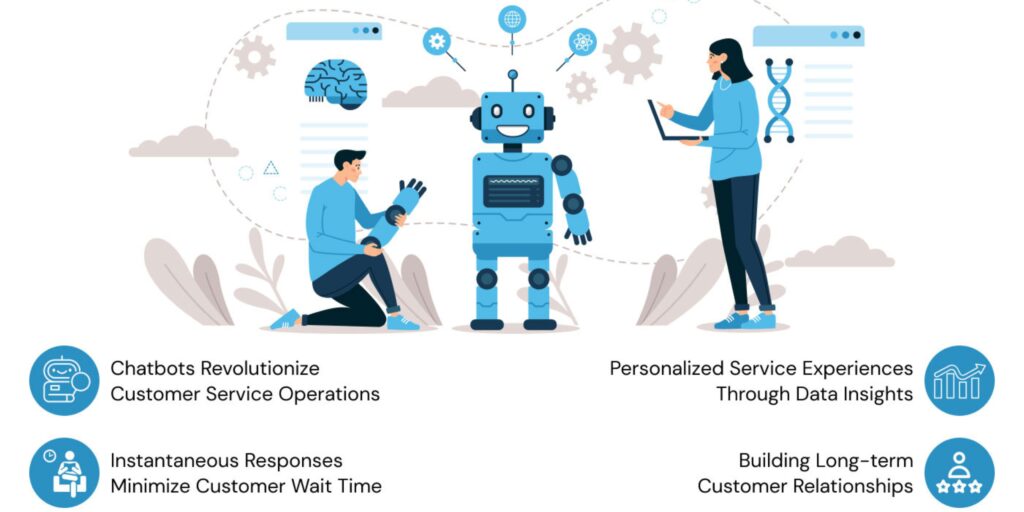
1. Instant Response and Availability 24/7
•One of the main useful features of chatbots is instant customer inquiries. While human agents need breaks and even sleep, chatbots work non-stop: twenty-four hours a day, seven days a week. In other words, this means that businesses can provide customer support twenty-four- seven without having to keep constant staff on duty.
•It means that chatbots can answer frequently asked questions of customers (order status, shipping details, product availability) so that customers do not have to wait for a response.
2. Cost-Effective Support Solution
•Chatbots are stocked up to thousands of inquiries at a time and do not require more human agents, which means reduced costs of customer support services. They serve businesses so cost-effectively that they become a measure to scale with the growing size of the company.
3. Personalized Customer Interactions
•Chatbots can personalize experiences through the training of AI and machine learning. For example, with the help of analyzing previous conversations, purchase history, and customer preferences, recommendations can be made regarding products, discounts, and other tips or information that are unique for a particular customer.
•Such personalized interactions with customers promote greater satisfaction, meaning that customers feel their needs have been understood and catered for.
4. Handling Multiple Queries Simultaneously
•Chatbots have the added advantage of not being restricted to one-on-one interaction, which is a distinct limitation of human agents, as chatbots can handle many queries at the same time. This results in great response times and no customer ever has to wait for assistance in a queue.
•Here is no question that this comes in handy-a lot-rather, during peak times or high-demand periods-where human agents might see themselves inundated with requests.
5. Consistent and Accurate Responses
•Chatbots provide consistent and accurate responses every time. This gives customers reliable information and reduces the chances of misunderstanding or error that human agents might bring in.
•They can be scripted to maintain a specific workflow and ensure that the same brand voice is carried with every customer interaction.
AI-Driven Content Creation and Curation
Creating content and curating them for a brand has become inevitable, especially in digital locations where speed always seems to ‘eat’ competition. For many years, marketers have relied on many robust tools to facilitate not just generation but personalized content for certain audiences, thanks to the rise of Artificial Intelligence (AI) into the marketing domain. They’ll be dressing up the approach to AI-driven content making and curating practices now for business ideas, where scaling up faster in cost-effective ways and maintaining high quality will take different shapes.
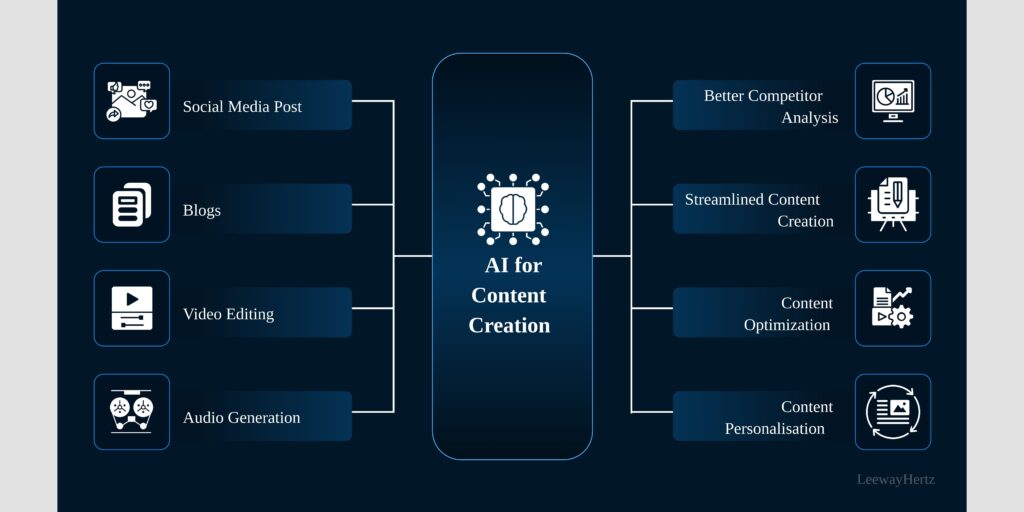
1. Automating Content Generation
•Content creators have now on hand AI instruments – GPT-3 and natural language-processing-based models – that can create high-quality written material on a massive scale. It takes a few seconds for these instruments to generate blogs, product descriptions, emails, and even social media posts – work that would take the content creator hours.
•By processing datasets regarding trending topics, keywords, and audience behavior, AI creates timely and relevant content that supplements your marketing goals. For example, an AI tool may generate blog content on newly trending fashion or write email copy directed at certain consumer segments.
2. Personalized Content Creation
•AI enables brands to customize content according to specific audiences by predicting their preferences, behaviors, and demographics. AI-based content recommendation engines can suggest personalized content to users based on their previous behaviors-whether blog posts, videos or articles.
•As brands deliver content that feels somewhat tailor-made for a particular audience customer satisfaction engagement and conversion can be greatly improved. For instance, AI can help e-commerce platforms suggest product options depending on a customer’s browsing history and interests.
3. Efficient Content Curation
•Through content curation, artificial intelligence can streamline the work of sifting through endless volumes of content using website algorithms to choose those few pieces from the larger media pool that correlate with a brand’s particular niche, audience interests, and ongoing industry trends. In effect, this gives marketers the relevant content without the work of manually searching for and sifting through content every day.
•Using these selection algorithms, the content curation software will go through articles, news, videos, and even social media posts and filter out those that should be broadcasted to your audience so that less soft currency is required to maintain an active social life within the walls of Facebook and blogs.
The Role of AI in Social Media Marketing
Social media marketing today can’t do without AI, as the method of interacting within an audience, managing campaigns, and measuring performances has been ingested by this technology. With personalized experiences, real-time interaction, and a strong focus on data-driven strategy already being buzzwords, it is AI that is allowing brands to utilize the platforms to their maximum capacity and therefore strike an impact. In this write-up, we delve into how AI is playing a role in social media marketing and changing the world for businesses.
1. Enhanced Personalization of Content
•Using AI techniques, data regarding user behavior, preferences, interactions, and demographics can be analyzed from millions of different sources as possible to produce very personalized material. Social media such as Facebook, Instagram, and Twitter already has this AI-supported curation of posts in users’ feeds based on previous activities, preferences, and interactions.
•On the back end of supporting AI in this case, brands would now be able to engage with their audiences through personalized experiences where content, products, or services could be recommended to individual users. This personalized content naturally entails not only engagement but also enhances the experience a customer goes through while using the platform, thus contributing to improved engagement and conversions.
2. Social Listening and Sentiment Analysis
•The role of AI in social listening involves keeping track of social media channels for the mention of their brand, competitors, or topics relevant to their industry. Thus, AI tools scan through tons of discussions and yield insight on what the users are saying about brands, products, or services at a near-real-time basis.
•AI sentiment analysis determines whether the tone of these mentions is positive, negative, or neutral, thereby helping brands evaluate public sentiment, respond to customer complaints in a timely fashion, and leverage positive sentiment to strengthen customer relationships.
3. Chatbots and Customer Engagement
•AI-driven chatbots are reforming customer service and social media engagement. These bots respond instantly to customer inquiries, being available for support 24/7. They resolve common issues instantly, including order tracking, product information, and service queries.
•Chatbots can also be used for lead generation by qualifying prospects and taking them through the sales funnel. They provide customers with an uninterrupted experience by lowering response time and increasing engagement on platforms such as Facebook Messenger WhatsApp and Instagram.
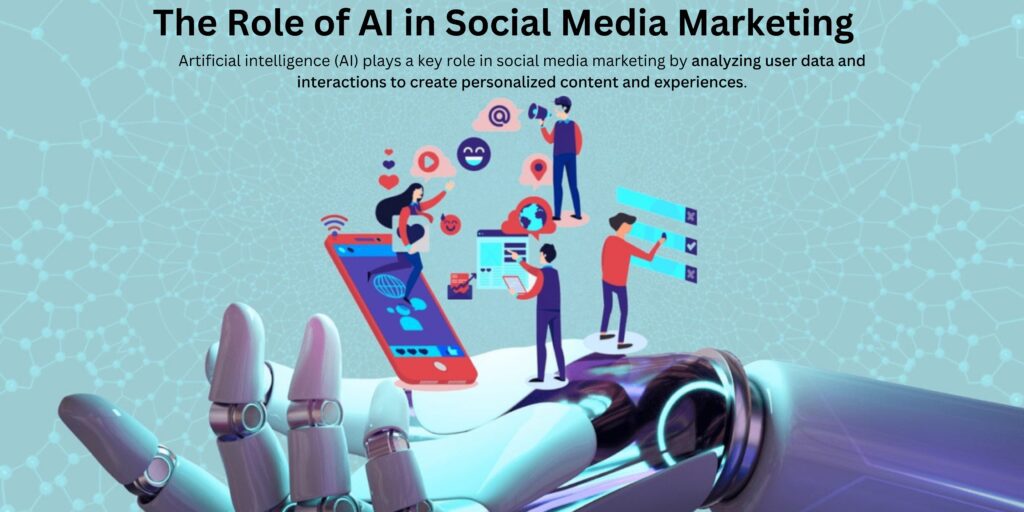
Embrace the Impact of Artificial Intelligence in your digital marketing strategy today—unlock smarter growth and better results!
Conclusion:
The Impact of Artificial Intelligence is the most possible revolutionary transformation in the ways businesses are relating to their audiences, optimizing campaigns, and driving engagement. By enabling all businesses to use AI-driven technology for personalization, automation, data analysis, or predictive insights, brands can always enhance the quality of the marketing strategies, improve customer individual experiences, and gain higher levels of efficiency. AI will soon be seen as a core technology adopted by most businesses today for it creates a paradigm shift in being competitive in this digital landscape that changes every day.



